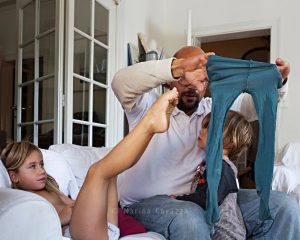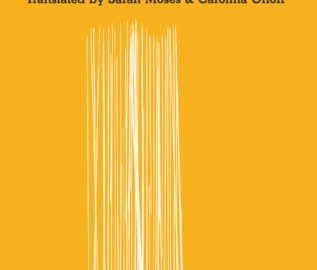
Portrait of a (Working) Mother is both a book (2019) and a touring exhibition of photographs and testimonies, co-edited and co-curated by Italian freelance photographer Marina Cavazza and Lithuanian scholar Egle Kackute (Universities of Maynooth and Vilnius). Portrait has previously been reviewed on the Make Mothers Matter website, and the exhibition has recently toured Geneva, Dublin (June 2018), and elsewhere. The exhibition shows a set of photographic and documentary case studies exploring the day-to-day routines, life projects and survival strategies of working mothers who leave their home countries. It emphasizes the extreme mobility that is required by the increasingly uncertain job market, and how the demands of the latter impact upon both family and workplace.
Accuracy: Based on data showing that women make up some 25% of all professionally employed expatriates today, Marina and Egle set out in 2013 to ask the following questions of a sample cohort of Geneva-based professional women, all expatriates in their mid-thirties: What happens to their careers when they decide to have children? How does that affect their professional and social status? Do they continue their career or go under the radar as members of an unaccounted for, supposedly non-productive, female population that passively follows the main (male) mover to a new location abroad? Do they thus become appendages to an international male elite, concentrating on home-making and keeping the family together, however temporarily? Does the (often involuntary) nomadism impede their personal development or does it create new opportunities and boost ambitions?

Interviewees included Petina, an international trade lawyer from Zimbabwe who sees herself as the “accidental” mother of an 11-year-old boy. She studied in Zimbabwe, Cambridge (UK) and Austria and moved to Geneva to work as a trade lawyer. Her son attends a boarding school in Scotland and his dad is in Zimbabwe. Not wanting to give up her career, she still feels strongly about motherhood: “I feel my son has completely changed my life in a way that being a lawyer or a writer hadn’t. He is the one person I can truly be myself with. It’s unconditional.” Oksana did not give up her job either. She came from Ukraine, studied International Relations, held an internship at the UN and met her Italian husband. She has been living in Geneva for 14 years and has now a son and a daughter who are quadrilingual and, like their parents, embedded in global culture. Irina has been following a more traditional model. She is Russian with a Canadian husband and looks after her two daughters. She was trained as an artist and continues to paint in her spare time. She appreciates the opportunity to take time of remunerated work. She says it is: “the luxury of bringing up my children myself. To raise a young child and turn her into a successful person is the most important task for me now.” She also believes that “men are supposed to provide for their families while women take care of the home and the children.” Marcella, an Italian human rights specialist, chose to work in Geneva when her daughter was born, although her husband continues to work in Congo. They see each other only every three weeks, but appreciate the chance to raise their children in a safe environment.
Whatever the differences between these interviewees, all are making choices in order to reconcile their children’s needs with their own. All three have enough personal, intellectual and economic resources to find a way that may not be the most convenient or typical, but which works for both mother and child.

Empathy: Egle and Marina use their firsthand experience of expatriate motherhood to describe an ephemeral community of people who learn to live with rootlessness. They met with other expatriate mothers – whether in paid or unpaid employment – in Geneva in order to document their family arrangements, choices, expectations and concerns through text and photography. Their work depicts a marginal group within the migrant population, in many respects highly qualified and privileged, but still barely visible. Egle and Marina focused on the gender divide that causes many internationally mobile mothers (and sometimes fathers) to experience complex professional and personal dislocation. Their creative project questions the challenges of raising a family in the globalised, competitive world and in the state of perpetual transition. Marina and Egle shared their most personal thoughts on their own life decisions; their project is a personal investigation as well as an artistic quest into the limits of female development (professional and personal) and maternal expression in the international expatriate environment.
- Egle says: “I might still be able to have a job and I will not stop working. Work and earning money has not always coincided for me, so working − reading, thinking and writing − is part of the process of being alive, of making life meaningful, finding out who I am, what I am capable of, growing intellectually and giving back to the world.”
- Marina says: “I made a choice to live in a couple, to have children and I knew that that meant a lot of my time would be spent with these people.”
Both women talk about the necessity to build a new life without being able to control it. Their experience of mothering, as presented here, combines adaptation and frustration as their own lives become centred around those of others. Egle and Marina follow here the French feminist philosopher, Luce Irigaray, who wonders why: “While the mother remains the condition of subjectivity and culture, she herself remains unrepresented, confined to her role of “mute substratum”.
Style: Every woman (or man) who agreed to participate in this project chose where and how they were photographed. Most chose to include their children in the frame, while their partners are conspicuously absent. This may be the mothers’ way of flagging their own competence in navigating the economic and social arenas without their partners’ help. The project undeniably lends unseen expatriate mothers faces and voices of their own. Each portrait has a unique emotional and psychological configuration. The slow succession of slides presenting women (and a few men) – listening, working, cooking, running, reading, standing, drawing, travelling, singing, Skyping, working… draws the observer into an environment where motherhood means reinventing one’s life in relation to financial independence and loss or gain of personal space, status and freedom. It shows a set of situations revealing both the challenges and opportunities associated with expatriate mobility, without ever being judgemental. It features mothers who are anchored in traditional social structures as well as those others who adapt their mothering practices and their conceptualization of motherhood to new environments. The exhibition re-draws a maternal landscape conceived in terms of relationships rather than geography, encouraging us to re-think mothering as a set of continuous adjustments to (dis)location in a globalised and mobile environment.

Text: Geneviève Guetemme
The Pregnancy Test Verdict: Positive – a bold and brave examination of real-life mothering in an uncertain world. Next blog post – back to fiction!

